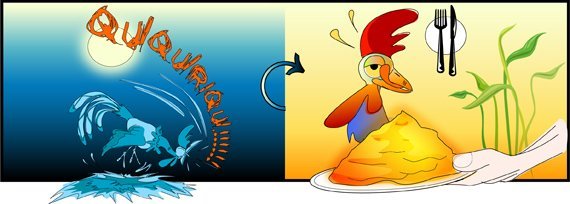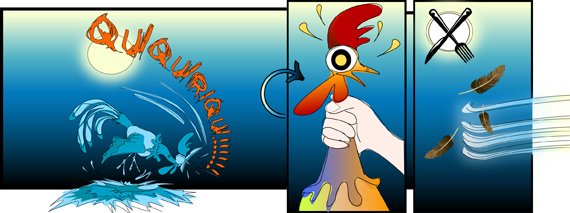| |
| |
 |
Bertrand Russell (1872-1970) és un dels pensadors
més fecunds i universals del segle XX: matemàtic,
lògic, autor polifacètic, premi Nobel de Literatura
i influent filòsof. Un pensador gens convencional que
recomanava "no renunciar mai a mirar les coses des
de més d'un punt de vista".
|
Seguint les passes del seu predecessor David Hume, qüestiona
el valor epistemològic del mètode inductiu. Els
procediments o mètodes deductius atorguen garanties
a les conclusions obtingudes, és a dir, el que és
vàlid per a tots, també ho és per una part.
Però els procediments o argumentacions inductives
extreuen conclusions universals a partir de dades o observacions
particulars, és a dir, del vàlid per una part, més
o menys representativa, es salta al vàlid pel tot. Quan argumentem
inductivament, insinua l'al·legoria, ens comportem com
els pollastres?
|
|
| |
| |
|
It is obvious that if we asked why we believe that the sun will rise
tomorrow, we shall naturally answer, "Because it always has risen
every day." We have a firm belief that it will rise in the future,
because it has risen in the past. If we are challenged as to why
we believe that it will continue to rise as heretofore, we may appeal
to the laws of motion. […]
 Experience has shown us that, hitherto,
the frequent repetition of some uniform succession or coexistence
has been a cause of our expecting the same succession or
coexistence on the next occasion. Food that has a certain appearance
generally has a certain taste, and it is a severe shock to our expectations
when the familiar appearance is found to be associated with an unusual
taste. […] Experience has shown us that, hitherto,
the frequent repetition of some uniform succession or coexistence
has been a cause of our expecting the same succession or
coexistence on the next occasion. Food that has a certain appearance
generally has a certain taste, and it is a severe shock to our expectations
when the familiar appearance is found to be associated with an unusual
taste. […]

A horse which has been often driven along a certain road resists the attempt to drive him in a different direction. Domestic animals expect food when they see the person who usually feeds them. We know that all these rather crude expectations of uniformity are liable to be misleading. The man who has fed the chicken every day throughout its life at last wrings its neck instead, showing that more refined views as to the uniformity of nature would have been useful to the chicken.

But in spite of the misleadingness of such expectations, they nevertheless
exist. The mere fact that something has happened a certain number
of times causes animals and men to expect that it will happen aggain.Thus
our instincts certainly cause us to believe that the sun will rise
tomorrow, but we may be in no better a position than the chicken
which unexpectedly has its neck wrung. We have therefore to distinguish
the fact that past uniformities cause expectations as to
the future, from the question whether there is any reasonable ground
for giving weight to such expectations after the question of their
validity had been raised.
RUSSELL. Problems of Philosophy
|
|
| |
| |
En la nostra vida quotidiana
tots fem ús de la inducció; els animals, també.
La inducció ens dóna seguretat psicològica;
però no seguretat lògica. El pollastre inductivista
anava incrementant la seva seguretat: cada vegada que se li portava
menjar obtenia una nova confirmació de la seva convicció.
La inducció sol fonamentar-se en la uniformitat o regularitat
de la natura: la natura no és capriciosa comportant-se
ara d'una manera ara d'una altra. Però, com es sosté
aquesta uniformitat? Constatant que en el passat o en un nombre
finit de casos ha estat uniforme o regular i que, per tant (induïm),
ho serà sempre. Així, doncs, es justifica el procediment
inductiu fent ús d'un procediment inductiu; aquesta fal·làcia
lògica s'anomena petició de principi.
Malgrat tot, la inducció ajuda a avançar en
el nostre coneixement de la natura. Les afirmacions universals que
no es podem mantenir inductivament, les podem proposar en termes
probabilístics. Si havent observat deu cignes hem d'abandonar
la nostra afirmació "tots els cignes són blancs"
ja que n'hem trobat un de negre, podem afirmar que la probabilitat
de què un futur cigne sigui blanc és de 0,9.
|
|
| |
|


Experience has shown us that, hitherto, the frequent repetition of some uniform succession or coexistence has been a cause of our expecting the same succession or coexistence on the next occasion. Food that has a certain appearance generally has a certain taste, and it is a severe shock to our expectations when the familiar appearance is found to be associated with an unusual taste. […]